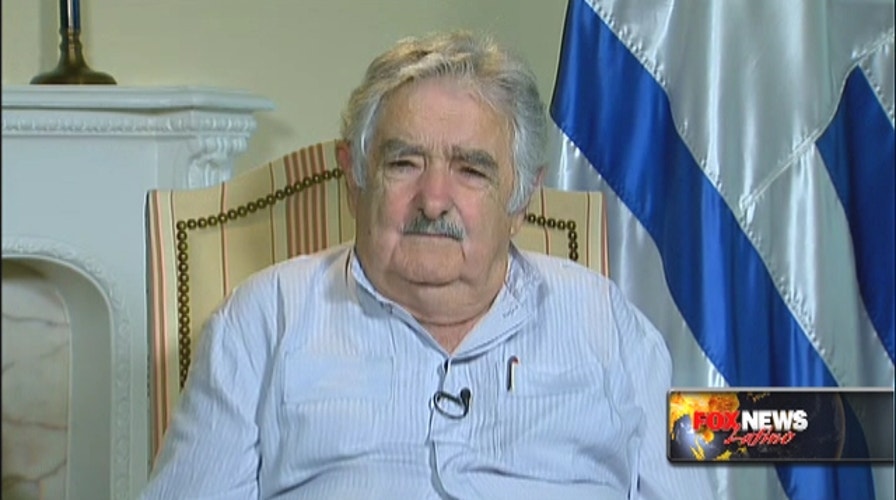Uruguay president on why pot should be legal
Uruguayan President Jose Mujica, whose nation is the first in the world to legalize marijuana, argued that it would not lead to widespread use of the drug, but instead would result in more control of its use and distribution.
Uruguayan President José Mujica, whose nation is the first in the world to legalize marijuana, argued in an interview with Fox News Latino that the law will not lead to widespread use of the drug, but instead would result in more control of its use and distribution.
That would be different, Mujica said, than the way Colorado is carrying out its legalization of marijuana, which the president – who visited Washington this week, and stopped at the White House to speak with President Obama – said seems in danger of not having appropriate checks and balances.
The country’s legalization of marijuana has been extremely controversial, even among Uruguayans, who fear that it would encourage the nation’s youth to smoke it, leading to an uptick in addiction.
Mujica, typically a low-key, soft-spoken man, bristles at his critics’ characterization of the marijuana law.
People, he said, have it all wrong.
“It’s exactly the other way around,” Mujica said in an interview with Fox News Latino from Washington D.C.
“Why? Because since the world’s beginning of time, what attracts young people is the forbidden, the mysterious.”
Make it legal, strip it of its mystique, and, as Mujica sees it, its allure will diminish.
Uruguay, he stressed, is not legalizing the drug as much as it’s regulating it, to get control of a market that is operated at the whim and lawlessness of criminal enterprises.
“This is not going to be a country of smoking weed liberally, quite the contrary,” Mujica said.
Uruguay’s system will involve keeping close records of who buys the drug, requiring them to register and keeping them to some 10 grams per week.
“Right now, every cow, 13 million of them, are registered here,” Mujica said. “We know where they were raised, what they eat – we’re the only country that does that,” he said. “We are going to apply a process just like that to marijuana laws.”
“If [people] want to consume more, we recommend treatment before the addiction grows,” Mujica said, “In other words, we try to treat him as a patient before his condition becomes critical, and starts to have consequences that are irreparable.”
Medicinal weed in Colorado requires a physician's recommendation, and the dispensaries will be separate outlets from the recreational pot retailers.
As for recreational pot, people 21 and older who have a Colorado ID may buy up to an ounce at licensed stores.
Mujica feels Colorado’s system will lack the circuit breakers needed to keep tabs on consumption, and see red flags if a person seems addicted or headed to addiction.
Mujica made his comments in a wide-ranging interview on various topics that also covered at his austere lifestyle, Cuba under the leadership of the Castro brothers, and smoking as one of the globe’s most worrisome killers.
Mujica, one a guerrilla fighter who tried to overthrow Uruguay’s government, is known for living with his wife in a humble way – a small, run-down home, off a dirt road. Mujica also drives around in a VW Beetle that is more than 20 years old, and he cooks his own food, rejecting the staff of more than 40 that was available to him at the presidential palace he could have moved into.
“My way of thinking on personal, family matters – without wanting to impose it on anybody – is based on one principle that can be summarized into this,” Mujica said, “live with a light baggage, because in the long run, we have to live as we think, because otherwise we run the risk of thinking as we live.”
He feels it is wrong, not to mention hypocritical, to live lavishly when most of his countrymen struggle to get by.
“I represent the majority, and the majority of my people can’t live as the minority lives – a life of privilege,” he said, “and I have opted to live the way the vast majority of my countrymen live.”
He likes to say that tobacco use each year kills more people around the globe than world wars combined.
“We haven’t made a dent in curbing the [cigarette] smoking habit,” he said.
“We must start at the school level, aiming for the young generation, to attack use and addictions,” he said.
More than 20 years ago, he said, about 2,000 people regularly smoked cigarettes in Uruguay. Today, he said, there are at least 150,000 in the nation of about 3 million.





